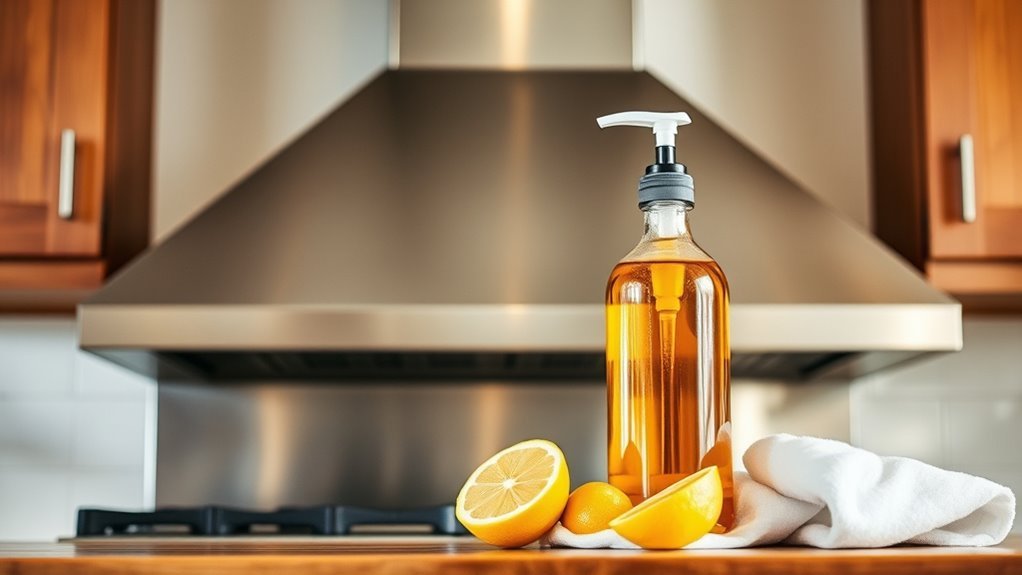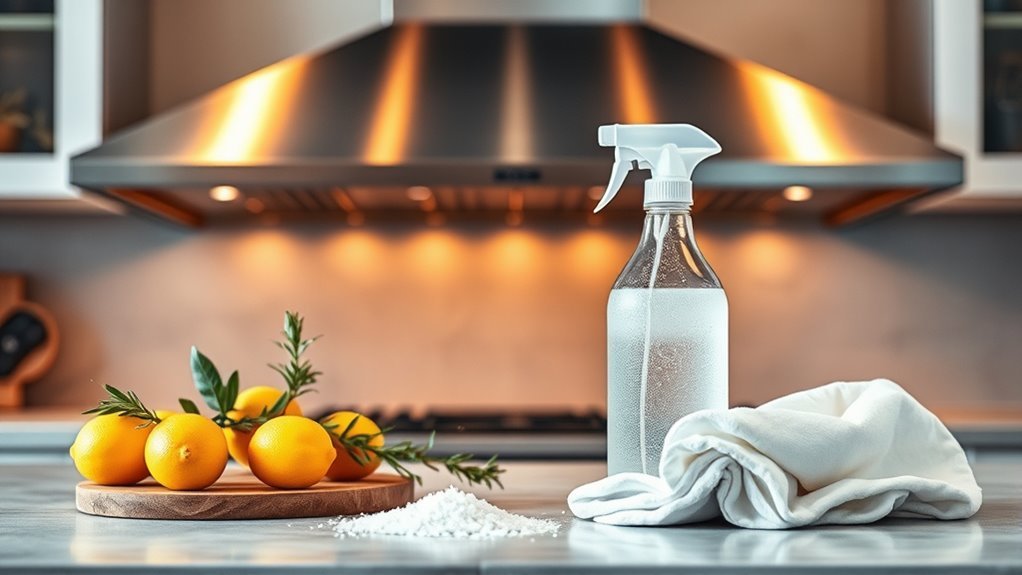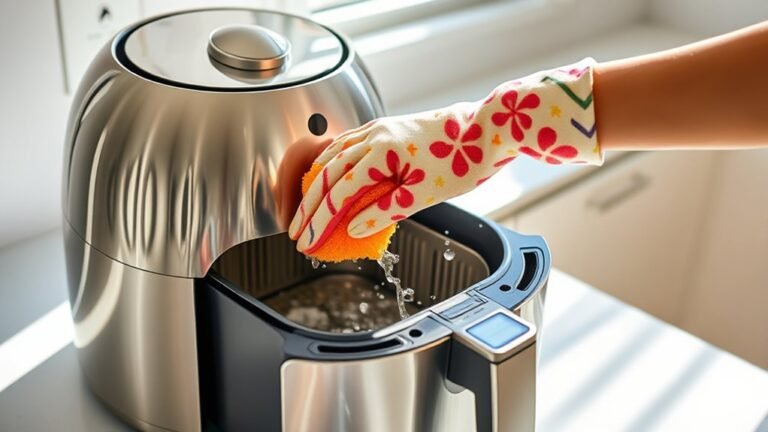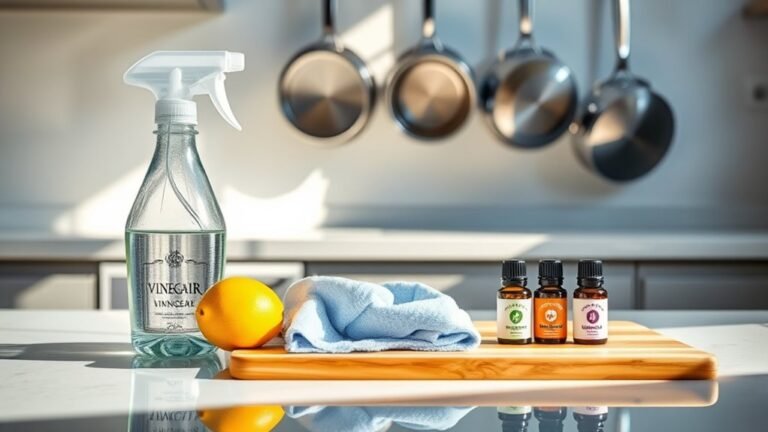Natural Cleaning Hacks for Your Range Hood
You can easily clean your range hood using natural ingredients like baking soda, vinegar, and lemon juice to cut grease and disinfect without harsh chemicals. Start by soaking filters in hot water mixed with baking soda and vinegar, then scrub gently. Use lemon juice to kill bacteria and freshen up, and clean the exterior with Castile soap and warm water. Regular upkeep keeps your hood efficient and odor-free. Keep going to discover more simple, effective tips for maintaining your kitchen’s air quality.
Gathering Your Natural Cleaning Supplies

Before you begin cleaning your range hood, you’ll want to gather a few natural supplies that are both effective and safe. Choosing eco friendly supplies helps you maintain a toxin-free kitchen and supports a cleaner planet. Simple homemade cleaners like white vinegar, baking soda, and lemon juice are powerful allies in cutting through grease without harsh chemicals. Grab a spray bottle for your vinegar solution, a soft cloth, and a gentle scrub brush to tackle stubborn spots. These items not only reduce waste but free you from relying on commercial products loaded with additives. By assembling these natural tools, you’re embracing a cleaner lifestyle and taking control of your environment—cleaning your range hood becomes a straightforward, liberating task.
Removing and Soaking the Range Hood Filters
First, you’ll need to carefully remove the filters from your range hood according to the manufacturer’s instructions. Next, soak them in a natural cleaning solution like a mix of hot water, baking soda, and vinegar to break down grease and grime. Once clean, make sure the filters are completely dry before reinstalling them to keep your range hood working efficiently.
Filter Removal Steps
There are typically two main steps to removing your range hood filters: releasing them from their slots and soaking them to loosen grease and grime. First, identify your filter types—most are either mesh or baffle—and locate the release mechanism, usually a latch or button. Gently press or slide it to free the filter without forcing it, preserving its shape and function. Keeping your filters in good shape is key to effective filter maintenance, so handle them carefully. Once removed, you’re ready to soak them, which helps break down stubborn buildup. Following these straightforward steps lets you take control of your cleaning routine with ease, giving your range hood the freedom to perform at its best without relying on harsh chemicals or expensive services.
Soaking Solutions Options
Two simple soaking solutions can make cleaning your range hood filters much easier and more effective. First, mix hot water with baking soda and white vinegar—natural ingredients that break down grease without harsh chemicals. Let the filters soak for 15 to 30 minutes to loosen stubborn grime. Alternatively, you can create a citrus-based soaking solution using lemon juice and hot water; the natural acids cut through grease while leaving a fresh scent. Both options offer a straightforward way to free your filters from buildup, giving you control over your kitchen’s cleanliness without relying on synthetic cleaners. Once you’ve chosen your soaking solution, simply submerge the removed filters and enjoy the satisfaction of a natural, effective clean that supports your desire for freedom from toxins and complexity.
Drying and Reinstalling
Once your filters have soaked long enough to break down grease and grime, you’ll want to let them dry completely before reinstalling. Choosing the right drying methods is key—air drying on a clean towel works wonders, offering a natural, hands-off approach that keeps you free from harsh chemicals or heat damage. Avoid using direct heat, which can warp the filters. When it’s time to put your filters back, follow simple reinstalling techniques: align the filter with the hood slots, gently slide it in place, and secure any latches or screws. Taking a moment to reinstall carefully guarantees your range hood runs smoothly and efficiently. Embrace these straightforward steps to keep your kitchen fresh and your cleaning routine liberating.
Using Baking Soda and Vinegar for Degreasing
You’ll love how baking soda naturally lifts grime without harsh chemicals, while vinegar cuts through grease with ease. Combining these two creates a powerful, safe cleaner for your range hood. Just be sure to rinse thoroughly and avoid mixing them in a sealed container to keep things effective and safe.
Baking Soda Benefits
Baking soda is a powerful and natural cleaner that can tackle the grease buildup on your range hood with ease. When you sprinkle baking soda on greasy surfaces, it works to break down stubborn grime without harsh chemicals. Plus, it doubles as an excellent odor neutralizer, eliminating cooking smells that linger in your kitchen. You’ll love how it freshens up your space while making cleaning feel less like a chore. To use, simply make a paste with baking soda and water, apply it to your range hood, let it sit for a few minutes, then wipe away with a damp cloth. This method gives you a thorough clean that’s safe, effective, and frees you from relying on toxic cleaners.
Vinegar Degreasing Power
Although vinegar alone is a strong degreaser, combining it with baking soda creates an even more powerful cleaning duo for your range hood. This natural blend leverages vinegar benefits like cutting through grease and neutralizing odors, while the gentle abrasion of baking soda lifts stubborn grime. Using these degreasing techniques frees you from harsh chemicals and complicated cleaners, making maintenance simple and eco-friendly.
Try this effective combo to:
- Dissolve thick grease layers effortlessly
- Freshen your kitchen with natural scents
- Reach tight corners and crevices easily
- Restore your range hood’s shine without damage
Embrace this easy, natural method to keep your cooking space fresh and grease-free, giving you the freedom to enjoy cooking without worrying about grime buildup.
Safe Application Tips
When using vinegar and baking soda to degrease your range hood, it’s important to apply them safely to protect both your appliance and yourself. Start by mixing small amounts to avoid excessive fizzing that can spill and cause a mess. Always test the solution on a hidden spot to confirm it won’t damage the surface. Use a soft cloth or sponge to gently scrub, avoiding abrasive tools that might scratch. Wear gloves to protect your skin from irritation, even though these are eco friendly products. Verify good ventilation to prevent inhaling vinegar fumes. These safe cleaning methods let you maintain your range hood effectively while enjoying freedom from harsh chemicals. Stick to these tips, and you’ll keep your kitchen fresh and your appliance in top shape.
Lemon Juice as a Natural Disinfectant
A splash of lemon juice can do wonders for disinfecting your range hood naturally. Thanks to lemon juice benefits, you get a powerful natural disinfectant that cuts through grease and grime without harsh chemicals. It’s perfect for those who want to keep their kitchen fresh and toxin-free while maintaining freedom from synthetic cleaners.
Lemon juice naturally disinfects and cuts through grease, keeping your range hood fresh and toxin-free.
Here’s why lemon juice is your go-to:
- Kills bacteria and germs effectively
- Leaves a fresh, clean scent behind
- Breaks down stubborn grease buildup
- Safe for most range hood surfaces
Cleaning the Exterior With Castile Soap

Two tablespoons of Castile soap mixed with warm water can transform how you clean your range hood’s exterior. This simple solution taps into Castile soap benefits like its gentle yet effective grease-cutting power, making stubborn grime disappear without harsh chemicals. To get started, dip a soft cloth into the mixture and wring out excess liquid. Then, wipe down the exterior surfaces, focusing on greasy spots and fingerprints. This approach respects your freedom to choose natural cleaning methods while delivering sparkling results. Once you’ve cleaned with this mixture, rinse the cloth in clean water and wipe again to remove any residue. These exterior cleaning techniques not only protect your range hood but also keep your kitchen environment fresh and chemical-free.
Maintaining Your Range Hood Regularly
Although regular maintenance might seem like a hassle, keeping your range hood in good shape guarantees it works efficiently and lasts longer. By committing to routine maintenance and regular inspections, you free yourself from unexpected breakdowns and costly repairs. It’s all about taking control and making your kitchen work for you.
Regular upkeep keeps your range hood efficient, durable, and saves you from surprise repairs.
Here’s what you can do:
- Schedule monthly checks to spot any wear or blockages early.
- Clean or replace filters as recommended to maintain airflow.
- Wipe down internal parts with natural cleaners to prevent buildup.
- Test the fan and lights regularly to verify everything functions smoothly.
Staying on top of these tasks helps your range hood breathe easy—just like you crave freedom in your space.
Tips for Preventing Grease Buildup

When you cook frequently, grease buildup on your range hood can quickly become a frustrating issue. To stay ahead, focus on grease prevention by wiping down your hood after each use with a natural degreaser like vinegar or lemon juice. This small habit keeps grease from settling and makes routine maintenance easier. Make sure to clean or replace filters regularly since clogged filters trap more grease and reduce efficiency. Also, consider cooking with lids on pots and pans to minimize splatter. Proper ventilation during cooking helps too—turn your hood fan on early and keep it running a bit after cooking to clear lingering grease particles. By incorporating these simple tips into your routine maintenance, you’ll enjoy a cleaner kitchen and extend the life of your range hood without extra hassle.
Frequently Asked Questions
How Often Should I Replace My Range Hood Filters?
Think of your range hood filter as a trusty gatekeeper, working tirelessly to keep your kitchen air fresh. To keep that gate swinging smoothly, you should stick to a regular cleaning schedule and plan for filter replacement every 3 to 6 months, depending on your cooking habits. This way, you gain freedom from clogged filters and enjoy clear, breathable air without the hassle of unexpected problems. Stay proactive, and your kitchen will thank you!
Can Essential Oils Be Used to Deodorize the Range Hood?
You can definitely use essential oils to deodorize your range hood. Their natural benefits not only leave a fresh scent but also help combat lingering odors effectively. Just add a few drops of your favorite essential oil onto a cotton ball or cloth and place it near the vent or fan. This simple deodorizing technique gives you a revitalizing, chemical-free way to keep your kitchen smelling great, while letting you enjoy the freedom of natural freshness.
Is It Safe to Use Natural Cleaners on Stainless Steel Hoods?
You’re about to commence on a gentle journey with your stainless steel, so it’s wise to choose natural cleaners that treat it with care. These earth-friendly options are generally safe and won’t harshly strip away the steel’s shine or protective layer. Just avoid anything too abrasive or acidic. Using mild, natural cleaners lets you maintain freedom from chemicals while keeping your stainless steel hood looking sleek and fresh.
What Are the Signs My Range Hood Needs Professional Servicing?
If you notice your range hood performance declining—like weaker suction or unusual noises—it’s a sign you might need professional servicing. Also, if you’re cleaning more frequently but grease buildup persists, that’s a red flag. Don’t let these issues limit your kitchen freedom; getting a pro to inspect and clean the internal parts guarantees your hood works efficiently, keeping your cooking space fresh and hassle-free.
Can Natural Cleaning Methods Remove Smoke Odors Completely?
Think of odor elimination like chasing shadows in the wind—natural cleaning methods can freshen your space and reduce smoke smells, but they rarely capture every trace completely. While they offer effective cleaning effectiveness for surface grime and lingering scents, some stubborn odors might cling stubbornly. If you crave true freedom from smoke odors, combining natural solutions with occasional professional help guarantees your range hood breathes fresh and clean, giving your kitchen the freedom it deserves.






